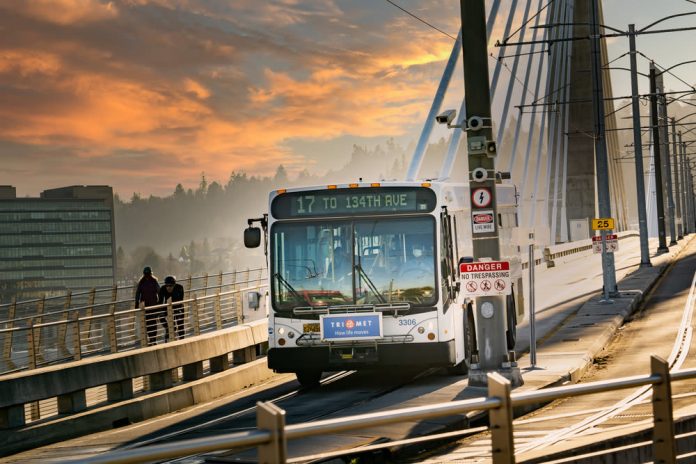It is unusual for a transit agency to publish a frank mea culpa, and yet, last week, that’s exactly what TriMet, which overseas public transportation in the Portland metro area did, across its social media channels.
“We’re sorry,” the message began. “Despite our service reduction earlier this year, we have been forced to cancel buses each day because of a severe operator shortage. And, this shortage is affecting MAX now as well, with more and more trains canceled due to a lack of operators.”
We’re sorry. Despite our service reduction earlier this year, we have been forced to cancel buses each day because of a severe operator shortage. And, this shortage is affecting MAX now as well, with more and more trains canceled due to a lack of operators.
— TriMet (@trimet) May 12, 2022
These are hard times in public transportation. Ridership—despite edging back up as a few more people gingerly find their way back to their offices—remains at around 50 percent of prepandemic levels, depriving the agency of a key revenue source. (In early 2019, bus, light rail trains, the streetcar, and the tram averaged around 2 million rides per week; in April, that figure edged above 1 million for the first time in two years.)
Meanwhile, labor shortages that have hit virtually every industry haven’t spared TriMet. In a manic one-click purchase era, Amazon and Walmart are trying to lure people with commercial driver licenses with six-figure salaries, further depleting the ranks of available candidates for school systems and public transit agencies, among employers.
The situation is dire. If the agency can’t hire enough new operators—plus support staff, mechanics, and other roles—already reduced schedules could be pared back even further.
“We need enough operators to sustain reliable service,” says TriMet spokesperson Tia York.
So the agency is going on the offense, including at a heavily publicized driver recruitment event in Portland this week that promised on-the-spot job offers (conditional ones: applicants still have to undergo a medical exam, pass a drug test and a criminal background check, have their references pan out, and ensure that they have a commercial learner permit.)
At the job fair on Tuesday, applicant Thor Dunn, who lives in Hillsboro, said he had previously worked at TriMet and enjoyed his coworkers and managers, but the pandemic-era role wore him down. “People were angry,” he says, “And I wasn’t coping in a healthy way. I figured I’d maybe test the market.”
He went to work for a limousine service, driving tourists and bachelorette parties to wine country or teenagers to prom, some days raking in tips upwards of $500. But the working environment there and the lack of stability when compared to his TriMet job wore on him, he said, so he’d returned to see about getting his old gig back.
TriMet’s sweetening of the salary pot hasn’t hurt, he added. When Dunn first started at the agency, he was making $15 an hour. Nowadays, in a nod to the tight labor market, the agency has raised salaries starting at $25.24 an hour; drivers top out three years later at $33.65 an hour, plus benefits.
There’s also that $7,500 hiring bonus that’s being promoted on the front of every bus and MAX train in town, though per the fine print it’s payable over three years: $500 in the first paycheck, $1,000 at the six-month mark, another $1,000 at the year anniversary, and then $2,500 lump sums at two years and three years of employment.
On Tuesday, about 160 people turned up to the agency’s job fair, and about 100 of them walked away with conditional job offers. Several of the attendees said the boost in salary brought them in the door.
“The hiring bonus and the wage increase motivated me,” said one candidate who works in security downtown and requested not to be named so his current employers wouldn’t find out that he was considering a new position. “I’ve looked into this before, but it was in the teens to start.”
He’d driven for Amazon in the past, he continued, but the unpredictability of life on the road, sleeping in his truck, hauling from Texas one day to Spokane the next, plus coping with traffic, had led him to conclude that even the fat salary wasn’t worth the toll it took.
“This has stability and benefits,” he added. “It’s an interesting job.”
Interesting is one word for it. Tempers have, shall we say, frayed these past two years, and the agency has had to pass a host of rules aimed at protecting its drivers, including potential banning of a rider should they spit on a driver or another TriMet employee. But Dunn says there is also an opportunity as a driver to help turn someone’s day around, cranky and time-pressed though riders might be.
Those who are hired go through seven weeks of training, and start off on the “extraboard”—filling in on varying routes for other drivers who don’t show up or call in sick. But there are plenty of opportunities to progress—within four to eight months, new drivers can be assigned to consistent routes, York says, and there are other promotion opportunities, too, like to driving light rail.
The only problem there, she says, is that internal promotions create yet more vacancies that need to be filled.

